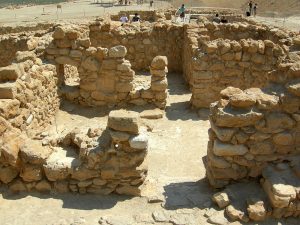Unlike other religions?
We noted last time that Thomas Madden in his course on early Christianity claimed, “Unlike any other ideologies at the time, Christianity also considered slavery — the institution of slavery — to be inherently wrong.” He said that attitude stemmed from their belief that: “Unlike other religions, Christianity held that all people, men or women, free or slaves, were the same in God’s eyes.”

As we will see, and as you probably already know, most Christians until relatively recently did not see slavery as inherently wrong. Further, despite Madden’s sweeping statement to the contrary, we do know of one Jewish sect that actually did condemn the practice. According to both Josephus and Philo, the Essenes did not keep slaves. As Philo wrote:
There is not a single slave among them, but they are all free, serving one another; they condemn masters, not only as representing a principle of unrighteousness in opposition to that of equality, but as personifications of wickedness in that they violate the law of nature which made us all brethren, created alike. (Quoted by the Jewish Encyclopedia from Philo, Vol. VI, Loeb Classical Library)
Granted, the Essenes set themselves apart from general society, dwelling in communes, keeping all things in common, and living as “free men.” So one could argue that since they lived in their own little world, they didn’t have to worry about letting loose a “frightful revolution” (in the words of the Catholic Encyclopedia).
However, the fact remains that the Essenes, not the Christians, were one of the few (if not the only) communities or sects in the ancient world who, it was believed, unequivocally condemned slavery. Moreover, they put their money where their mouths were.
[T]hey emancipated slaves and taught them the Law, which says: “They are My servants (Lev. xxv. 42), but should not be servants of servants, and should not wear the yoke of flesh and blood.” (Jewish Encyclopedia)
They pooled their resources and purchased the freedom of enslaved Jews. That’s pretty remarkable. Of course, we should temper our respect with the textual evidence that the Qumran community may have indeed kept slaves. Jennifer Glancy writes:
Continue reading ““With All Fear”: Christianity and Slavery (Part 2)”
